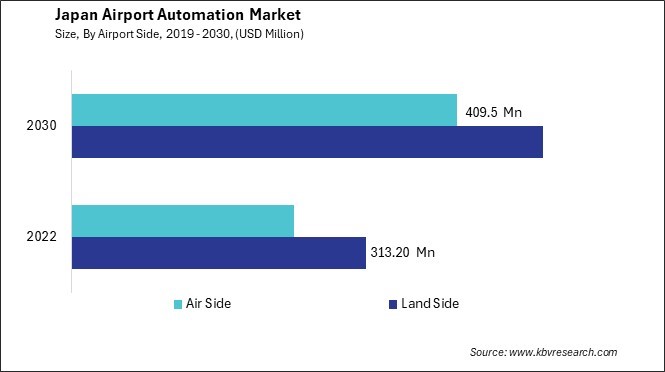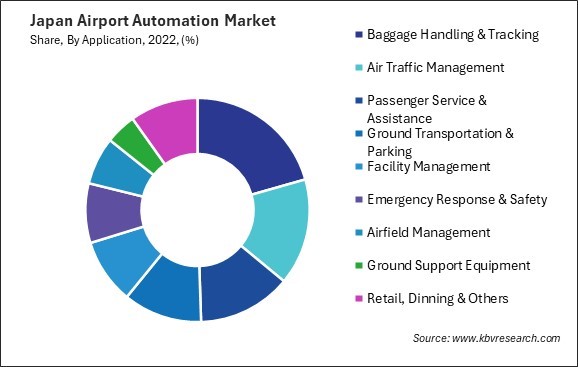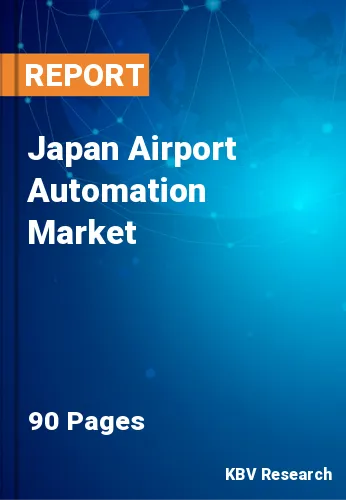The Japan Airport Automation Market size is expected to reach $910.21 Million by 2030, rising at a market growth of 6.1% CAGR during the forecast period.
In Japan, the airport automation market has witnessed significant growth and innovation in recent years, driven by the country's commitment to technological advancement and efficiency in air travel operations. The airport automation market in Japan encompasses a wide range of technologies and solutions aimed at streamlining airport operations, enhancing passenger experience, and improving overall efficiency. Japanese airports have deployed various automation solutions to optimize processes and reduce operational costs, from self-check-in kiosks and automated baggage handling systems to advanced biometric authentication and facial recognition technologies.

With Japan being a popular tourist destination and a major hub for international travel, the demand for efficient and seamless airport operations has been steadily increasing. This has led airport authorities and stakeholders to invest in state-of-the-art automation solutions to handle the growing passenger traffic while ensuring safety and security. Additionally, Japanese airports have been enhancing the passenger experience through automation, with features such as self-service immigration and customs clearance, automated wayfinding systems, and mobile-based boarding passes becoming increasingly common.
Furthermore, Japan's aging population and workforce shortages in certain industries have prompted the adoption of automation technologies to fill the gaps and improve productivity. Automated check-in counters, self-service baggage drop-off points, and automated security screening systems are examples of how Japanese airports leverage automation to address these challenges.
The COVID-19 pandemic has profoundly impacted the aviation industry worldwide, including in Japan. The pandemic has highlighted the importance of automation in ensuring safety and minimizing physical contact between passengers and airport staff. As a result, there has been an increased focus on touchless technologies and automated processes to reduce the risk of virus transmission in airports. For instance, Japanese airports have implemented temperature screening systems, touchless check-in kiosks, and automated disinfection protocols to mitigate the spread of COVID-19 and reassure passengers of their safety. These measures have become integral parts of the airport automation infrastructure in Japan, further driving airport automation market demand for innovative solutions that prioritize hygiene and health.
Japan's travel and tourism industry has long been known for its efficiency, punctuality, and commitment to providing services to domestic and international travelers. The industry has significantly transformed in recent years by integrating advanced automation technologies, particularly in airports. As a technologically advanced nation, Japan has been at the forefront of adopting automation solutions in various sectors, and the airport industry is no exception. The country's airports have embraced automation technologies across different touchpoints of the passenger journey, ranging from check-in and baggage handling to security screening and immigration processes.
According to the International Trade Administration, the Japanese outbound travel sector has surged to unprecedented heights, hitting a milestone of 20.1 million travelers. This trend underscores the robust demand for international travel among Japanese citizens and highlights the importance of efficient services and infrastructure within Japan's airport automation market to accommodate this burgeoning tourism industry.
Furthermore, Japan has also implemented automated baggage handling systems, which utilize advanced robotics and conveyor belt technologies to transport luggage from check-in counters to aircraft efficiently. These automated systems minimize the risk of errors and mishandling while improving airports' overall baggage handling capacity.
In addition to check-in and baggage handling, automation has revolutionized security screening procedures at Japanese airports. Advanced technologies such as biometric authentication, facial recognition, and automated passport control gates have been deployed to enhance security measures while expediting passenger screening. Hence, Japan's travel and tourism industry has significantly transformed by integrating advanced automation technologies, security, and the overall passenger experience throughout its airports.
In Japan, the airport automation market is witnessing a notable shift towards enhancing passenger experience. One key area of focus in enhancing passenger experience is through self-service kiosks and automated check-in counters. These technologies allow passengers to check in, print boarding passes, and even drop off luggage without the need for extensive interactions with airport staff. Another aspect of the airport automation market in Japan is implementing biometric technology for identity verification.
Moreover, Japanese airports invest in automated security screening systems to expedite the process while maintaining stringent safety standards. Advanced imaging technology and machine learning algorithms enable faster and more accurate detection of prohibited items, reducing the need for manual inspection and minimizing disruptions for passengers.
Furthermore, integrating mobile apps and digital platforms is becoming increasingly prevalent in Japanese airports, allowing passengers to access real-time flight information, navigate the airport, and avail of various services such as duty-free shopping and dining reservations. These digital solutions cater to the preferences of modern travelers who seek convenience and accessibility throughout their journey. Therefore, the airport automation market in Japan is rapidly evolving to prioritize passenger experience through self-service kiosks, biometric technology, automated security screening, and seamless digital integration.

The airport automation market in Japan is a crucial sector within the country's aviation industry, marked by continuous innovation and technological advancement. One of the prominent players in the Japanese airport automation market is Yokogawa Electric Corporation. Yokogawa specializes in providing automation and control solutions across various industries, including aviation. In the airport sector, the company offers a range of products and services such as control systems for baggage handling, security systems, and integrated airport management platforms. Focusing on precision engineering and reliability, Yokogawa's solutions contribute to the seamless operation of airport facilities in Japan.
Another significant contributor to the airport automation market in Japan is Mitsubishi Electric Corporation. Mitsubishi Electric is renowned for its innovative technologies such as electrical equipment, automation systems, and transportation solutions. The company offers automation solutions for airport infrastructure within the aviation sector, including air traffic control systems, baggage handling systems, and passenger boarding bridges. Mitsubishi Electric's advanced automation technologies aim to optimize airport operations, improve efficiency, and enhance the overall passenger experience.
Fujitsu Limited is also a notable player in Japan's airport automation market, leveraging its information technology and digital solutions expertise. The company provides airport automation solutions, including passenger processing systems, self-service kiosks, and biometric authentication systems. Fujitsu's focus on digital innovation and cybersecurity ensures that airports in Japan benefit from reliable and secure automation technologies to streamline processes and enhance security measures.
Furthermore, Hitachi, Ltd. is actively involved in the Japanese airport automation market, offering comprehensive airport infrastructure and operations solutions. Hitachi's portfolio includes automated baggage handling systems, security screening technologies, and airport management software. By integrating advanced analytics and IoT capabilities, Hitachi's solutions enable airports in Japan to improve operational efficiency, enhance safety, and provide a seamless travel experience for passengers.
Moreover, Nippon Telegraph and Telephone Corporation (NTT) offers telecommunications and networking solutions for airport automation and digital transformation initiatives. NTT's expertise in network infrastructure, cloud computing, and cybersecurity supports developing and deploying advanced automation technologies in airports across Japan. Hence, the Japanese airport automation market is characterized by intense competition and a strong emphasis on technological innovation.
By Airport Side
By Automation Level
By System
By End Market
By Application
Our team of dedicated experts can provide you with attractive expansion opportunities for your business.

